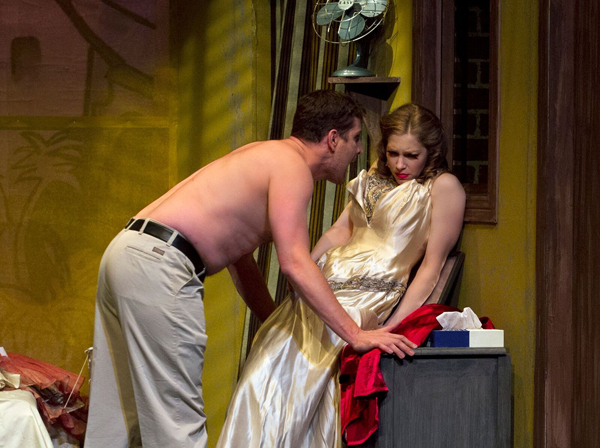A Streetcar Named Desire: Challenging subject matter tackled adeptly

Reviewed by Natasha Lomonossoff on March 22, 2018
As a theatre usually known for staging pleasant comedies and murder mysteries, the Ottawa Little Theatre’s current production of the classic American drama by Tennessee Williams, A Streetcar Named Desire, marks a promising new direction for it. Directed by Sarah Hearn, this production captures much of the essence of Williams’ script without whitewashing the difficult subject matter and periodic violence that is seen onstage. Strong performances by the cast and skillful scenic techniques (especially the projected backdrop and unique use of light) further augment the theatrical experience of the play.
Set in 1947 of the French quarter of New Orleans, A Streetcar Named Desire introduces us to the lives of Blanche Dubois, her sister Stella and her brother-in-law Stanley Kowalski. Upon falling on hard times and losing the family plantation in the process, Blanche comes to live with Stella and Stanley in their tiny two-bedroom apartment. Hardly anything goes happily from here, however, as the tension between Blanche and Stanley eventually erupts into something horrific which her sister can neither prevent nor control. Disturbing secrets are also gradually revealed about Blanche throughout the course of the play, putting her seemingly innocent character into question.
The performances of the three main characters, by Laura Hall (Blanche), Megan LeMarquand (Stella), and Dan DeMarbre (Stanley) are all reasonably credible. Hall’s portrayal of Blanche remains largely true to the character’s dainty yet dishonest nature; sufficiently demanding when she first arrives, Blanche convincingly morphs into a deluded and scared shell of her former self as the play progresses. LeMarquand gives a similarly strong performance as Blanche’s well-meaning but wilfully naive sister. The contradictions of her character are each presented convincingly in, from Stella’s cavalier attitude to her husband’s violent outbursts to the deep concern she expresses for Blanche. While DeMarbre’s portrayal of Stanley has its strong moments (particularly when his character has angry outbursts and expresses anguish at Stella leaving), his performance is not as consistent; there are moments when his character is less forceful or more chipper than he should be. Nevertheless, the dark side of his character is appropriately not glazed over in this production. Stand-out portrayals of minor characters include the Kowalskis’ sassy, no-nonsense neighbour Eunice (Amy Kennedy) and the gentlemanly Mitch (Kurt Shantz), who becomes Blanche’s one-time love interest.
The set by Robin Riddihough is designed is such a way that it helps to create an authentic sense of what a small, shabby apartment in the 1940s may have looked like. Furniture and appliances are appropriately run-down, with the too short curtain separating the rooms as a symbolic reminder of what little space there is between Blanche and her family. The brick walls bordering the set on each side are effective pieces in establishing the neighbourhood beyond the apartment, as well as the projection of city buildings on the backdrop directly behind it. Lighting by David Magladry also greatly complements the show’s atmosphere. Beyond keeping the stage well illuminated, lighting pieces that are a part of the set are utilized in clever ways. The Chinese paper lantern in the apartment, when lit, acts as a symbol of Blanche and Mitch’s potential relationship as they are in its line of sight; once the latter destroys it, any potential is gone too.
One minor detail which I felt took away from the theatricality of the show is how the scenic transitions ae conducted. Having the runners visibly come on in (with the stage semi-lit) between scenes to shift furniture and other items onstage breaks the illusion a bit, in my opinion.
Aside from this one aspect, however, OLT’s production is still a very engaging one which prompts thinking about the difficult issues the play tackles, in addition to providing an authentic visual spectacle.
A Streetcar Named Desire runs until April 6- 7. For information and tickets, call 613-233-8948 or email info@ottawalittletheatre.com